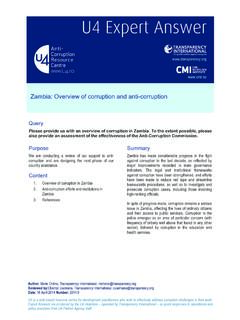Transcription of CODES OF ETHICS FOR THE POLICE - Transparency …
1 2013 Transparency International. All rights reserved. CODES OF ETHICS FOR THE POLICE QUERY Could you please provide examples of good practices for developing a code of ETHICS for the POLICE ? CONTENT 1. Key features of CODES of ETHICS for the POLICE 2. Good practice for developing CODES of ETHICS for the POLICE 3.
2 References \\\\\\\\\\\\\\\\\\\\\\\\\\\\\\\\\\\\\\\\ \\\\\\\\\\\\\\\\\\\\\\\\\\\\\\\\ Author Marie Ch ne, Transparency International, Reviewer Robin Hodess, Ph. D., Transparency International Date 21 January 2013 SUMMARY CODES of ETHICS for the POLICE can play an important role in promoting an organisational culture of integrity, making all law enforcement officials aware of the ethical responsibilities of their position, and using peer pressure to promote ethical standards and strengthen integrity across POLICE forces.
3 They can outline broad fundamental values underlying professional standards of conduct through general statement of principles or be more prescriptive and detailed in their approach, providing concrete guidance on behaviours to avoid, as well as on how to behave in sensitive or problematic situations. While law enforcement officials must adhere to the same standards of conduct as other public officials, there are additional issues to be regulated in their CODES of ETHICS , due to the specificities of their duties and considerable powers entrusted to them.
4 This includes obedience to the law, the use of force, the use of data and information, performance of duties and non-discriminatory policing , as well as guidance on key areas of corruption risk (bribery, gifts and hospitality, conflicts of interest, and post-separation requirements). As CODES of ETHICS are not self-implementing, there needs to be a dynamic process of communicating, interpreting, training, enforcing and assessing the code . There is a broad consensus that such implementation mechanisms need to be tied to the code .
5 CODES OF ETHICS FOR THE POLICE 2 1 KEY FEATURES OF CODES OF ETHICS FOR THE POLICE Transparency International s Global Corruption Barometer data shows year after year that the POLICE are perceived as one of the most corrupt institutions in a wide variety of countries around the world. Law enforcement officials can easily manipulate the considerable powers entrusted to them for private gain or political purposes, undermining public order, the rule of law and citizens trust in public institutions. Yet, restoring public trust in law enforcement institutions is crucial to effective policing .
6 Against this background, strengthening the integrity and accountability of law enforcement institutions is essential to effectively combat corruption and break the circle of impunity. As POLICE officers need the trust of the public to perform their duties effectively, there is a general understanding that they must be held to higher standards of moral and ethical values (DeShon 2000). As part of this process, it is important to promote an organisational culture of integrity, making all law enforcement officials aware of the ethical responsibilities of their position and using peer pressure to promote ethical standards and strengthen integrity across POLICE forces (Ch ne 2010).
7 The development and implementation of CODES of ETHICS or CODES of conduct for POLICE staff can be an important step of this process. Objectives of developing CODES of conduct CODES of ETHICS are usually used by law enforcement institutions to set principles, values and standards of ethical and professional behaviours, and to outline requirements, limitations or prohibition on officer conduct and activities within the agency (International Association of Chiefs of POLICE ). In this sense, in addition to guiding behaviours, these CODES function as a professional statement, expressing commitment to a set of values and standards.
8 More specifically, they typically aim at: setting out the values and principles the organisation or the profession stands for (for example, equity, impartiality, loyalty, non-discrimination, human rights and compliance with the law) promoting ethical behaviour and preventing unethical behaviour raising awareness on sensitive and often problematic matters associated with POLICE operations specifying when possible actions and behaviours conflict with the responsibilities of law enforcement officers providing guidance to officers when they are confronted with such decisions or situations Contents of the CODES General overview Law enforcement officials must adhere to the same standards of conduct as other public officials.
9 As per article 8 of the United Nations Convention against Corruption (UNCAC). In terms of content, as for other public sector institutions, CODES of ETHICS should summarise all relevant information with regard to the institution s operations, including: the objective of the code ; a statement of the institution s main goal; a statement of ethical values and principles; a set of fundamental prohibitions, including specific guidance in areas of corruption risks (conflicts of interest, abuse of office, gifts, disclosure of assets, use of state property and assets, among others).
10 Supplementary restrictions (outside income and post-employment); procedures and bodies for reporting, investigating and sanctioning violations; responsibility and sanctions; and whistleblower protection provisions. For more information on CODES of conduct for public officials and members of government, please see previous Helpdesk answers that provide guidance on the content and development process of such CODES which also apply to law enforcement institutions: code of Conduct for Public Officials and Members of Government can be accessed through the Anti-corruption Helpdesk: The Effectiveness of CODES of Conduct can be found here.

















